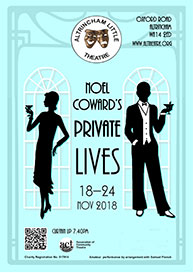Association of Community Theatre

PRIVATE LIVES
by Noel Coward
Altrincham L.T.
 Noel Coward had the nickname of “the Master” and watching his plays or any of his films, one can understand just why he earned that title. In this play, first produced in 1930, he played Elyot and persuaded Gertrude Lawrence to cross the Atlantic to play Amanda. She didn’t need much persuasion and came almost before she was asked. The play is described as a comedy of manners and tells the story of a divorced couple, while on honeymoon with their new spouses, only to discover they are staying in adjacent rooms, with connecting balconies, at the same hotel in France as their former spouses. Despite a perpetually stormy relationship, they realise their feelings for each other. There is s second act love scene that was nearly censored in Great Britain as, at the time, it was thought to be too risqué. Coward wrote the song “Some Day I’ll find you” especially for the play and it has remained popular ever since. When one considers some of the famous names who have starred in the four important parts, one begins to realise why it is still being performed. I’ve already mentioned Coward himself and Gertrude Lawrence, so add Laurence Olivier, Richard Burton, Elizabeth Taylor, Tallulah Bankhead, Maggie Smith, Penelope Keith, Alan Rickman, Matthew McFadyean, and the fact that John Gielgud has directed it, then it begins to read like a Who’s Who of theatre.
Noel Coward had the nickname of “the Master” and watching his plays or any of his films, one can understand just why he earned that title. In this play, first produced in 1930, he played Elyot and persuaded Gertrude Lawrence to cross the Atlantic to play Amanda. She didn’t need much persuasion and came almost before she was asked. The play is described as a comedy of manners and tells the story of a divorced couple, while on honeymoon with their new spouses, only to discover they are staying in adjacent rooms, with connecting balconies, at the same hotel in France as their former spouses. Despite a perpetually stormy relationship, they realise their feelings for each other. There is s second act love scene that was nearly censored in Great Britain as, at the time, it was thought to be too risqué. Coward wrote the song “Some Day I’ll find you” especially for the play and it has remained popular ever since. When one considers some of the famous names who have starred in the four important parts, one begins to realise why it is still being performed. I’ve already mentioned Coward himself and Gertrude Lawrence, so add Laurence Olivier, Richard Burton, Elizabeth Taylor, Tallulah Bankhead, Maggie Smith, Penelope Keith, Alan Rickman, Matthew McFadyean, and the fact that John Gielgud has directed it, then it begins to read like a Who’s Who of theatre.
There are three Acts which necessitate change each time and, as ever, your company came up trumps with your version, cleverly using some features from Act 2 in Act 3, which, by clever re-positioning, made the rooms appear different, as to their use in different hands. Well done.
Act One showed adjoining balconies with identical table, chairs and white tablecloths. Entrances from the hotel rooms were SL and SR. Act 2 showed Amanda’s flat in Paris but, of course, after leaving the hotel at the end of Act 1, Amanda and Elyot are now together again. By Act 3 Victor and Sibyl having arrived, are now sleeping there as well, hence some judicious change was necessary.
Despite the fact that in this play, each character, all four of them, are individuals and full of idiosyncrasies, they are still a foursome dependent on each other. It is not a farce where, as we know, working together as a team is vital. It is so with this one, but not in the same way. Here we have four characters totally dependent on each other. As actors, they love and yet fall out only to get together again, they argue, taunt each other, use sarcasm, lash out verbally and occasionally physically, console, show affection and perhaps, above all, have real senses of humour. They enjoy their lives. In other words, they are working with each other in an understanding way that is mutual, so that when they have to do or say things, in a way they are in a real life situation, not just one Noel Coward has put them in. This is the difficult job he has set you and this is why you have so many famous predecessors. What’s all this lecture about? I didn’t mean it to be – it’s just that for me and, I think, your audience, that is exactly what you did. You all worked for, off, with, and to each other and you showed the amateur dramatic world (our world) why the play is still entertaining people eighty-eight years after opening.
Phil Harrison played Elyot Chase with ease and confidence and seemed to have a ready answer to all the slings and arrows thrown at him, He had an infectious smile which he used naturally to light up what he was doing and saying, and which had played an important part in his two marriages and seen the return of the first affair, He was a man of his time, at home in his social status, pouring the right drink regularly. He showed his feelings for both spouses, and his relationship with Victor was an interesting one. So natural in his movement and manner – an all round interesting and enjoyable performance
Emily Duffy was Sibyl Chase, Eliot’s second wife.She played the character with grace, subtlety and super poise. She was full of bounce and mischief and used the most expressive of faces to good effect. Her accent was real and genuine and we enjoyed the venom that was part and parcel of her relationships – one of the many comedy highlights.
Vince Bowers played Victor Prynne, the second husband of Amanda, with a feeling for words, and there was a lyrical desperation about his characterisation. He used the stage well seeming to be frequently on the move, arguing, declaiming, justifying, full of energy and ideas. He maintained throughout the pace he had set himself, or the director had suggested to him. A worthy foe for Elyot and after all, two spectacular women must have fancied him sometime or other.
Alison Bowers was Amanda, now paired with Victor after Elyot and she had come to the parting of the ways. She graced the proceedings, giving as much as she got and throughout gave us many opportunities to surmise what living with Elyot was like. Once involved, she entered fully into the spirit of all that was going on. Her performance was extremely likeable and easy on the eye, and played with a well maintained accent. A truly realistic and believable portrayal as a distinctive Coward character. I liked the way she appeared to enjoy, with an enigmatic smile, one of Coward’s theatrical devices at the end of some plays when the main characters tip toe out unnoticed, while the others bicker on as ever c.f. “Present Laughter” “Hay Fever”. “Blithe Spirit”.
It speaks well of a company that can cast an actress of such talents as Kathryn Fennell in the tiny part of Louise, the French maid. It also says much for the dedication and wholehearted commitment of Kathryn. Well played.
Congratulations to Malcolm, your director, for his direction of this famous play. It was a studied, detailed, quite adventurous production, tailor made for its surroundings. I feel sure his rehearsals were fruitful and enjoyable – that was obvious from the performances on stage and audience reaction. It is not an easy play to direct – you did a super job with it and well done to everyone involved, both on and off stage.
Thank you as ever for your hospitality and warm welcome. Happy playmaking.